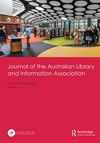学术图书馆的实践社区:实施策略
IF 1
4区 管理学
Q3 INFORMATION SCIENCE & LIBRARY SCIENCE
Journal of the Australian Library and Information Association
Pub Date : 2023-04-03
DOI:10.1080/24750158.2023.2205559
引用次数: 0
摘要
这本薄薄的书是由一位美国教授和图书馆从业人员撰写的,主要讨论了社区实践小组(CoP)的目的、价值、执行、参与模式和潜力。Etienne Wenger的一句话在开篇中被用来建立参数:“实践社区是一群人,他们分享一个关注,一组问题,或者对一个话题充满热情,并通过持续的互动加深他们在这个领域的知识和专业知识。”作者后来评论道,“想想在你的生活中,你经常和一群人聚在一起,随意讨论棘手的问题和问题的情况。”她提到了她的第一个母亲小组,以及在厨房餐桌上非正式地分享的谈话。作者提出,缔约方会议的核心在于开发一套共享的工具和想法,然后针对一个反复出现的问题启动这些工具和想法。许多仪式必须被考虑在内——这就是本书所要描述的。建立社区的方法在接下来的一章中讨论了参与是什么样子的,以及协作对话如何为不同的想法和积极的倾听留下空间。在后面的章节中,探讨了以启发为目的的讲故事,以及如何鼓励他人以创造性的、令人回味的语言分享他们自己的经历。以一种非正式的方式开始对话可以刺激小组,更深入的理解是知识的基础。第7章的项目列表支持产生有价值的反思实践的想法,并突出了书面记录,以促进更广泛和更深入的对话。鉴赏性探究(AI)作为一种考虑可能的方法进行了探索,然后作者着眼于利用正念的价值。在这本书中有关于建立CoP的优秀想法和策略。在一篇更短、更简洁的期刊文章中,它能提供同样多的信息吗?是的,有可能。然而,大多数读者不会介意一些重复和法医诊断,作者始终保持着温暖迷人的语气。本文章由计算机程序翻译,如有差异,请以英文原文为准。
Communities of practice in the academic library: strategies for implementation
This slim volume, written by an American professor and library practitioner, is focused on the purpose, value, execution, participation model, and potential of a communities of practice group (CoP). An Etienne Wenger quote is used in the opening to establish the parameters: ‘Communities of practice are groups of people who share a concern, a set of problems, or a passion about a topic, and who deepen their knowledge and expertise in this area by interacting on an ongoing basis’. The author later comments, ‘think of any situation in your life where you regularly gather with a group of people and casually discuss thorny issues and problems’. She cites her first mothers’ group and the talk shared informally around a kitchen table. The author proposes that the heart of a CoP lies in developing a shared repertoire of tools and ideas and then launching these at a recurring problem. A number of observances must be accounted for – and this is what the volume sets out to describe. The approaches to building community segue into a chapter addressing what participation looks like, and how collaborative conversations leave space for diverging ideas and active listening. In a later chapter, storytelling for illumination purposes is explored, and how this can encourage others to share their own experience in creative, evocative language. Opening the dialogue in an informal way can stimulate the group, and deeper understanding underpins knowledge. A bullet list in chapter 7 supports ideas for generating valuable reflective practice and highlights the written record to promote a wider and deeper dialogue. Appreciative inquiry (AI) is explored as a method of considering what might be possible, and then the author looks at the value of harnessing mindfulness. There are excellent ideas and strategies in this book for setting up a CoP. Could it have been as informative in a shorter, more succinct journal article? Yes, possibly. However, most readers won’t mind some repetition and forensic diagnosis, and the author maintains a warm engaging tone throughout.
求助全文
通过发布文献求助,成功后即可免费获取论文全文。
去求助
来源期刊

Journal of the Australian Library and Information Association
INFORMATION SCIENCE & LIBRARY SCIENCE-
CiteScore
3.40
自引率
15.40%
发文量
65
期刊介绍:
The Journal of the Australian Library and Information Association is the flagship journal of the Australian Library and Information Association (ALIA). It is a quarterly publication for information science researchers, information professionals, related disciplines and industries. The Journal aims to stimulate discussion and inform practice by showcasing original peer reviewed research articles and other scholarly papers about, or relevant to, the Australian and Southern Asia Pacific regions. Authors from the full range of information professions and areas of scholarship are invited to contribute their work to the Journal.
 求助内容:
求助内容: 应助结果提醒方式:
应助结果提醒方式:


